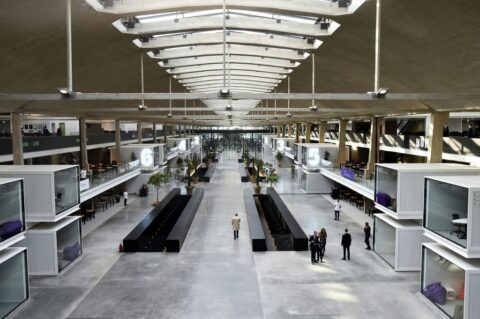
Every year, hundreds of (very) early stage startups choose to participate in one of the startup programs of Station F, an iconic startup campus based in Paris. And Station F has shared a list of the 40 most promising startups as part of the Future 40 selection.
Some of them participate in Station F’s own programs, such as the Fighters Program for entrepreneurs with underprivileged backgrounds and the FemTech Program for startups working specifically on female health, women’s sexual health and more.
Others join Station F through third-party companies that have signed partnerships with Station F to run their own tiny little incubator inside of the startup campus. These partners include Microsoft, Binance, LVMH and a newly announced AI program with Meta and Hugging Face.
It’s also worth noting that, last year, Station F completely overhauled its flagship in-house program — the Founders Program — to turn it into a sort of startup accelerator. In exchange for a 1% equity stake, startups are invited to workshops and classes to iterate rapidly on their projects. There are some demo pitches and some opportunities for one-on-one time with advisors.
“At first, we want to remain founder friendly. Some people told us it’s not a lot, others say that it’s a lot,” Station F director Roxanne Varza told me at the time of the change. “But Station F is not here to take 50% in equity. We just want to prove that we have skin in the game and that we will remain engaged,” she added.
That’s why this year’s Future 40 list is more interesting than usual as some of them are technically backed by Station F itself. I’ll share the full list of startups at the bottom of this article, but I wanted to highlight some of the interesting ones first.
In France, a lot of houses started showing cracks following an intense summer draught. WeatherMind is using computer vision to automatically assess damages due to natural disasters. That could be helpful for insurance companies.
Another interesting startup is Argil, which sounds a bit like Dust. This company lets you build AI assistants that can answer work questions based on internal data stored in Google Drive or Notion. Of course, Notion itself isn’t standing still as it now offers its own AI assistant.
One of the most successful French startups is Mirakl, a software-as-a-service solution for e-commerce retailers and B2B companies that want to add a marketplace of third-party products to their own platform. Nopli is one of this year’s Next 40 companies that want to help retailers add a marketplace of second-hand products to their site. Tuffery has already started using it for second-hand clothes.
Jitter looks like a promising creative tool. The best way to describe it is that it works a bit like Figma, but with a focus on motion design. People use it in a web browser to collaborate on animated content. And given how PhotoRoom and Mojo have thrived here in France, it’s going to be interesting to keep an eye on Jitter.
Louise is working on fertility and plans to use AI to improve the patient journey and get better results. That’s an interesting use case for AI.
I could go on and on as other startups caught my eye — but I want to keep this selection short. I’ve also covered some of them already on TechCrunch, such as Revyze and Flowie.
